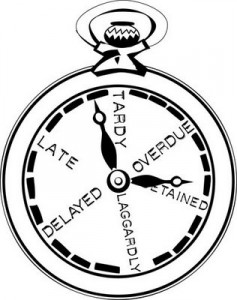 Confession-is-good-for-the-soul time. My biggest professional failing is lateness. I always overestimate how quickly I can get things done, and I’m always doing more than one thing, so once a project falls behind schedule, I’m playing a constant game of catch-up… and the lateness causes a cascade into everything else I’m doing, causing them to be be delayed as well. Next thing I know, I’m left feeling like I’m simultaneously juggling five or six balls while also desperately treading water trying to avoid drowning.
Confession-is-good-for-the-soul time. My biggest professional failing is lateness. I always overestimate how quickly I can get things done, and I’m always doing more than one thing, so once a project falls behind schedule, I’m playing a constant game of catch-up… and the lateness causes a cascade into everything else I’m doing, causing them to be be delayed as well. Next thing I know, I’m left feeling like I’m simultaneously juggling five or six balls while also desperately treading water trying to avoid drowning.
(Yeah, I know — my stress-metaphors don’t fuck around.)
The side effect of the cascade is that I’m constantly working with several projects which are all behind schedule — which makes working on each one that more difficult, due to the peculiarities of how my brain works. Logically, I know that if project A is the latest, I should knock that out until it’s done, and move on to project B, which is less late, then on to C, which is barely late. Somewhere in the misfiring neurons of my stress-addled mind, however, if I try to concentrate on A, then thoughts of B & C intrude, nagging at me almost to the point of panic. “We’re late,” they cry. “You need to get this done!” And so my work on A is like crawling over broken glass (see? I wasn’t kidding about the stress-metaphors). I often end up trying to bounce between projects to shut down the nagging, which of course doesn’t really do anything but slow down the completion process.
This is one of those things where working for yourself puts you at a disadvantage. I’m pretty sure if I had somebody telling me “DO PROJECT A.” I could concentrate purely on that — and then they could point me at the next task. Adamant, however, is a one-man shop, plus freelancers, co-developers, etc. Which means that everything bottlenecks through me, and I’m the guy standing over myself, giving the orders.
The result is 7-day work weeks, filled with 12-16 hour days. I can’t allow myself to unclench, to give myself any down-time, as long as there are projects which need work… and there are always projects which need work. Lack of down-time means that my immune system is stress-weakened, which often results in my getting slammed by whatever bug is going around, which has the added joy of making me feel even worse — and making my work even slower and the projects even later.
So it’s a failure of which I am exceedingly aware.
Folks ping me all the time, though — via social media, email, forums, etc. Fans, for the most part. Enthusiastic. “When is X coming out? Is it out yet? When? How about now? I’m dying over here! Now? Come on!”
On the one hand, I know this is a positive thing. People look forward to the stuff I release. They want it. This is, of course, far better than the alternative — that they don’t care or don’t even notice.
On the other hand, though? A gut-twisting knife, every time. Seriously — actual physical discomfort. A stark reminder of my failing. Massive injections of additional pressure and stress …and I know it’s not intended to be that. It’s genuine interest from genuine fans, and I absolutely hate that my brain has managed to turn that into a negative thing.
So I end up using my lunch break to write out a blog post like this, in the hopes that putting it down in black-and-white will force my mind to stop doing that.
How about you folks? How do you keep from falling behind (or whatever your own personal failing may be)? How do you hack your own brain to stop responding in ways that are detrimental to your work?



I don’t manage not to fail. I manage to figure out how to account for that. It’s the thing that separates successful project managers from those who crash and burn, and it’s called slippage. Slippage happens. You oversleep, something doesn’t come in that should, something doesn’t go out that should, something comes in but it’s wrong, someone gets the flu, the power goes out, someone from your licensor suddenly feels they have the right to demand you strip every bit of non-basic html code from their site…. something.
When you plan a project, you build in time for things to not go perfectly. In my personal life, that means that I figure out what is going to be the first thing to fall off the back of the truck figuratively speaking, and what can absolutely not be allowed anywhere near the back of the truck for fear of ruin and flames if it doesn’t get done, and what gets stuffed in a side pocket for now but absolutely has to be done by X date. I build out my schedule, I allow for some downtime (because me burning out means that the whole truck goes up in flames) and I delegate if I have to or if I can, and then I juggle the rest. Prioritize, schedule, answer your “what-ifs,” acknowledge that slippage happens, acknowledge that all your resources have limitations (including yourself) and move on.
My short-lived stint as a real (if handicapped) project manager taught me a lot. My ongoing stint in grad school showed me how to apply it to my life. This doesn’t mean I’m perfect at it or that I never stress, but it does mean that I’m a hell of a lot better at it than I used to be. Also, I hate project management software (though I’m going to be using it if we ever get more projects going at once for Play Attention) but Google Calendar is a godsend.
It’s impossible to never fall behind, but I minimize it as best I can by scheduling myself ruthlessly and not cutting myself any slack. Tired? Too bad. Got other things to do? Oh well. Want to hang out with friends? Not until you’re done. I am my own taskmaster, and whenever I whine to myself about it I remind myself that I chose to do this for a living, and I have to treat it as a real job if I want to succeed at it. It doesn’t hurt that I once screwed up a deadline big time, and instead of outrage the editor was disappointed in me. That hurt, and I’ve never forgotten it–and I’ve never blown a deadline since, and only rarely been even remotely late on any.
Dedicate a portion at the end of every day to planning your next day’s work. Write it down in whatever medium works for you and check it off when it is done. If something doesn’t get done that day, that’s Ok; move it to the next day’s list. And so on.
It really only takes about 15 minutes each day and will save you a TON of cascading stresses.
I am open about where I am on each project and do updates about movement on each project. As Greg Stolze has said before Transparency Breeds Trust. I believe if you provide updates rather than waiting for the questions you forestall questions if your saved from having to answer 2 questions with one post someplace.
I focus on project C as my day job.
I delegate people who are willing to help (often for minor amounts of compensation) on project B. Line Developer, Designer, Editor etc. I am fortunate in that I have a tight nit group of talented freelancers who I have had handle entire patronage project’s for us.
When it comes to project A. I work when I have free time as if it were my project back when I was a freelancer who had a regular day job.
Steven Russell
Rite Publishing
First thing is to correct the time estimates. This isn’t easy, because if you’re good at what you do – and obviously, you are – then your mind sets up a best-case scenario. I habitually add half as much time again if things are quiet, and double it otherwise. I have to force myself to do this, but it really is essential.
Second things is to make your expected delivery dates visible, and keep them updated. That stops people asking you, and avoids that particular stress source. It’s not nice to have to update the webpage from “Expected completion of first draft: 20th Feb” to “Expected completion of first draft: 4th March”, but it’s less painful than answering 6 emails asking the same thing. Or indeed, getting them. Do it stage by stage, so that you can see things like “First draft: complete”, “Beta reading: complete”, “First edit: complete” and so on.
Third thing is to make good lists. “These are the things I need to do for Project C”. And then if something comes to mind when you’re working on Project A, put it on the list, where it’s safely captured, and you can work on it at the right time.
And the fourth thing is to make people around you aware of this system, and make it visible to them. Not that you need to allow them input to it – although that can help, for some people – but that they can see what’s going on.
YMMV, of course, but I’ve found these things to be immensely helpful. I’m currently doing a double-workload day job, which sometimes involves travel and/or arbitrary new tasks, studying for an undergrad degree, and running a few regular games, and I remain one of the least stressed people I know.
Whatever I think the time needed for a particular part of the project, I double it.
Regardless of how much email or meetings I have, if there’s an urgent project, I schedule a block of time (two hours or more) to do nothing but work on that project. No meetings, no emails, no nothing.
If things are REALLY behind, I put up an email autoresponder as if I were on vacation, and I spend a couple of days digging in.
I also budget days off into my schedule. 80-hours weeks will lead to sure burnout.
Also, I’ve found that weekly blog updates about projects helps to stave off the “is it coming yet?” requests.
Anyone waiting for one of your products (I’m guessing it’s ICONS related) will understand *perfectly* if it’s going to be late.
Every single one of those Icons enthusiasts admires all the work you have done and will understand that health comes before everything else. Period.
Take a break. Work is work but life is life. Nothing supercedes peace of mind and health.
‘Albatross’ by Fleetwood Mac. Check it out. Best stress relief song ever for a guy who makes one of the best supers RPGs ever.